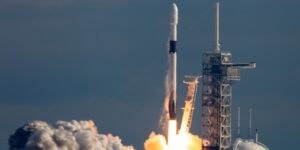The first lunar landing, which took place on July 20, 1969, caused the entire world to stop in its tracks. Millions of people were captivated by the historic Apollo 11 mission that sent astronauts Neil Armstrong, Buzz Aldrin, and Michael Collins to the Moon, and it has endured as a testament to human achievement. This extraordinary journey changed the course of space exploration and gave countless individuals the desire to explore the universe.
The Cold War space competition between the US and the Soviet Union planted the seeds for Apollo 11’s achievement. In a show of technological supremacy between the two superpowers, President John F. Kennedy issued a bold challenge to put a man on the moon by the end of the 1960s. Although it seemed impossible at the time, this ambitious aim propelled American scientists, engineers, and astronauts to dedicate their lives to making it a reality.
From the robust Saturn V rocket that launched the men into orbit to the Lunar Module “Eagle,” which enabled Armstrong and Aldrin to descend to the Moon’s surface, the Apollo 11 mission was a wonder of technological innovation. Each element of the mission was meticulously planned and put through a rigorous testing process, demonstrating the competence and commitment of countless people who worked behind the scenes.

Armstrong and Aldrin exited the Lunar Module, becoming the first people to put foot on another celestial body, as the world held its breath. Armstrong’s famous quote, “That’s one small step for man, one giant leap for mankind,” perfectly encapsulated the gravity of the situation. Our knowledge of the Moon and its origins has been profoundly impacted by their brief investigation of the lunar surface, during which they planted the American flag, gathered samples, and carried out tests.
The victorious return of Apollo 11 to Earth solidified its place in history by demonstrating the limitless potential of human invention and the strength of cooperation. The expedition not only increased our understanding of the universe but also motivated a new group of scientists, engineers, and astronauts to pursue their dreams of space travel. The succeeding flights of the Apollo program built on the achievements of Apollo 11, deepening our understanding of the lunar environment and laying the foundation for continued space exploration.
The legacy of Apollo 11 is still felt today as we keep expanding the capabilities of space flight. The Moon landing inspires us to aspire even higher and aim for the seemingly impossible by serving as a tribute to the strength of human curiosity, tenacity, and invention. We bring the spirit of Apollo 11—an odyssey that grabbed the world’s imagination and irrevocably altered history—as we set out on fresh explorations into the depths of space.

